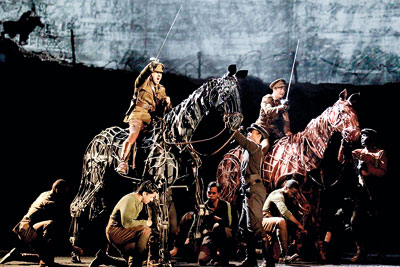Hitting Broadway against all odds
View(s):Facing many obstacles as an ‘actor of colour’ Sri Lankan Sanjit De Silva who refused to give up on his dream of realising a career in film and theatre went on to land a role in the Broadway hit War Horse while also taking to play-writing. Here in an e-mail interview with Smriti Daniel he discusses what it means to be an artiste true to one’s convictions
In 2007, the confluence of the Writers’ Guild of America strike and new fatherhood made Sanjit De Silva consider giving up acting. In a piece printed in the Actors Centre Journal in 2009, Sanjit agonised about what he owed his young son and whether he would be able to provide for him. “It seemed like every audition I went on, I brought the weight of those questions into the room with me,” Sanjit wrote, “And, as a result, I gave mediocre auditions and dreaded walking into those rooms, because I felt so tense and full of anxiety about the fact that I needed to get the job to make sure I could give my son a future.”

Sanjit stuck it out, rediscovering not only the fierce passion he had for his art but also the wisdom he had learnt over years as a struggling actor, one whose looks often limited the roles he was offered. “I think knowing the reality of what you face as an actor of colour is important, but it is more important to constantly make your personal passion and desire to be an artiste greater than the need for a job,” Sanjit told the Sunday Times in an email. “If you tie your self-worth to each audition, it’s going to be a long road for you. But if you see the business as one part of a greater picture of what it means to be an artiste, then you can always find a way to keep the embers of your creativity burning. You don’t become an actor to be rich. You become an actor because you know it is the fullest expression of what you can contribute as a human being.”
Sanjit didn’t know it then, but waiting for him was an experience many actors only ever dream of – a plum role in a hit Broadway show. Sanjit was thrilled, particularly when one of the things the directors asked him to be was the front end of a horse. The production, which would bring author Michael Morpurgo’s beloved novel ‘War Horse’ to the stage, relied on exquisitely wrought, life sized puppets to represent the animals around which the plot revolved. The Sri Lankan born actor was also simultaneously cast in two other roles – a Welsh infantry soldier named Taff and a German named Dr. Wilhelm Schweyk. ‘War Horse’ was an instant success, receiving five Tony Awards in 2011 (including Best Play) and running for 718 performances before closing in January this year.
Sanjit says performing on Broadway was an ambition he had never expected to realise. “I had somewhat given up on the idea that I would be on Broadway as an actor of colour, and certainly not in a play set in World War I where all the characters were from the small town of Devon in England!” Sanjit gives directors Tom Morris and Marianne Elliott credit for his good fortune – they wanted a cast as diverse as New York City itself was. As the play went into its second year, Sanjit was allowed to switch roles, playing the part he had understudied the year before, that of the aristocratic Major in the British Army, James Nicholls.
“There was a period when we were rehearsing the new cast and still doing the show with the old cast and that was quite a challenge to go from rehearsing Nicholls’ during the day to performing Taff at night, but as we opened with the new cast in January of 2012, I was more than ready to take the stage as Lieutenant James Nicholls,” says Sanjit. However, before Sanjit could ride a horse, he had to be one.
When he first went in, Sanjit was particularly excited about the opportunity to manipulate the large puppet horses. There were the smaller ‘mustering horses’ and then there was Heine who needed two people to animate him. In the ‘heart’ position, Sanjit puppeteered the front legs and simulated breathing, while another puppeteer manipulated the hind legs and the tail. The actors wore backpack straps that allowed them to heft the 60 pound puppets. Sanjit took for his mandate something the creators of Heine at the Handspring Puppet Company once told him. “They said that our job is to give life to the puppet, to use breath and motion to transform pieces of bamboo and gauze into flesh and bone – and that truly is the magic of ‘War Horse’.”

A scene from War Horse: Sanjit (second from left kneeling) is the foreleg puppeteer. Pic by Paul Kolnik
Though Sanjit describes the experience as “among the most challenging and physically draining things” he’s ever done, his first stint on Broadway didn’t make him feel like he’d made it – that happened much earlier in a production of Measure for Measure in Manhattan which his parents came to watch. “The look of pride on their faces and knowing that they finally believed that I was meant to be an actor – that is the closest I have ever come to feeling like I made it.”
Determined to give their children every opportunity, Luke and Rohini De Silva (née Selvadurai) had first applied for jobs outside Sri Lanka after the 1983 riots, moving their family to Uganda and then to Connecticut, where they found a home in Stamford in 1988. As a “good South Asian child” Sanjit was studying biology and on track to go to medical school when he found himself drawn into the performing arts. “I started off taking acting classes to boost my grades, and instead found a medium that seemed to strike a chord at the very heart of my being,” he says. “So to please my parents and keep a good back up plan I got my Biology degree and to pursue my passion I got my Performing Arts degree.”
The two fields weren’t as disparate as you’d imagine. Biology, says Sanjit, was about “trying to find the physiological processes by which we operate as human beings.” Similarly, an actor’s job is to “mine the humanity within the character so as to present a narrative of how a specific human being operates in the world”; to him both fields represent different approaches to the same goal of answering the big questions about humanity and how and why we exist.
It took him three years, but Sanjit decided to commit to a career in film and theatre. He worked as a production assistant on films like Spike Lee’s ‘Summer of Sam’ and Milos Forman’s ‘Man on the Moon’ but he was soon convinced that his place was actually on the other side of the camera. He would be in some “bad off-off-off Broadway productions,” before finding himself in the Shakespeare class at the Public Theater in NYC on a scholarship and under the career changing tutelage of an acting teacher named Ron Van Lieu. “He changed my whole notion of what great acting was,” says Sanjit, explaining that he followed Ron to the New York University’s Graduate Acting Program, once more on a full scholarship.
Sanjit’s packed resume includes several off Broadway plays including ‘The Little Foxes’, ‘A Mids-ummer Night’s Dream’, ‘Masked’, ‘Macbeth,’ ‘Measure for Measure’, ‘Slipped Disc,’ ‘In The Heart of America’ and ‘Indian Ink’, while he would have screen time in ‘The Girl is in Trouble’ (produced by Spike Lee), ‘The Company Men’ (starring Ben Affleck and Tommy Lee Jones), ‘August’ (starring Josh Hartnett) and ‘American Desi’. He’s also had guest star roles on popular shows like ‘Blue Bloods’, ‘Law & Order’ and the multi-award winning ‘The Good Wife’.

Sanjit in the movie ‘Arranged’ and left, below, another production
Despite his successes, Sanjit has found his roles were often decided by the colour of his skin. “Of course, as an actor of colour, the truth of the matter is that there are just less roles available for us period.” Though understandably frustrated he channelled it into creating his own plays with the Rising Circle Theatre Collective – a company in NYC dedicated to empowering and telling stories by artists of colour. “Through the company I co-wrote three plays with Deepa Purohit (who is one of the founders of the company, and now my wife!) and helped start a playwrights laboratory called INKtank to further develop emerging writers of colour.” They chose stories that were not only missing from the mainstream but ones that moved them – they were also liberating themselves in the process. “I firmly believe that casting doesn’t change till people behind the scenes, the people writing the stories change. It was clear I couldn’t just sit around and wait for a role,” says Sanjit, adding it was about finding and promoting other artiste who could as well.
Both in acting and in writing, Sanjit has found meaning in exploring what it means for us all to be humans together. “Because we have to find a way to make sense of the life we have,” he wrote, concluding that 2009 journal entry, “one of the most important ways is to see that many other people share our experiences. In that knowledge, we then know that we are not so alone, that we are actually part of something bigger than ourselves. And that is truly something worth attaching yourself to.”
Follow @timesonlinelk
comments powered by Disqus

















